Key takeaways:
- Tooth sensitivity can result from enamel erosion, gum recession, and habits like teeth grinding.
- Symptoms include sharp pain from temperature changes, discomfort during oral hygiene, and lingering aches.
- Treatment options include desensitizing toothpaste, fluoride treatments, and professional dental procedures.
- Managing sensitivity involves gentle brushing, avoiding extreme temperatures in food/drinks, and using fluoride mouthwash.
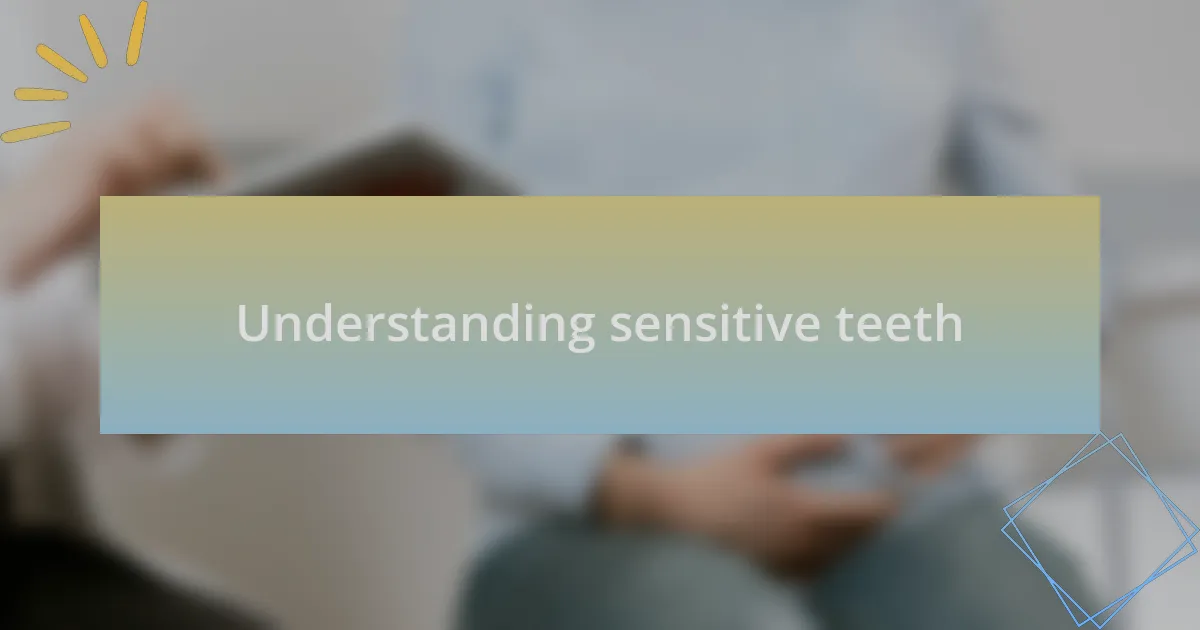
Understanding sensitive teeth
Sensitive teeth often feel like a hidden annoyance, don’t they? I remember the day I took a sip of iced tea, only to wince as a sharp pain shot through my tooth. That moment highlighted just how real and uncomfortable tooth sensitivity can be, making something as simple as enjoying a cold drink a daunting experience.
In essence, tooth sensitivity occurs when the protective enamel wears down or when gums recede, exposing the underlying dentin beneath. This dentin is packed with tiny nerve endings that can react dramatically to temperature changes, sweet or acidic foods, and even touch. Have you ever experienced that sudden jolt of pain from a seemingly innocuous bite? It’s a common frustration that many share, and recognizing its causes is the first step towards finding relief.
I often find that patients don’t realize how common sensitive teeth are. It’s easy to feel isolated in your discomfort, but countless others know this feeling all too well. Understanding that sensitivity can stem from various issues—like aggressive brushing or grinding teeth—may spark a sense of relief: you’re not alone, and there are solutions to explore.
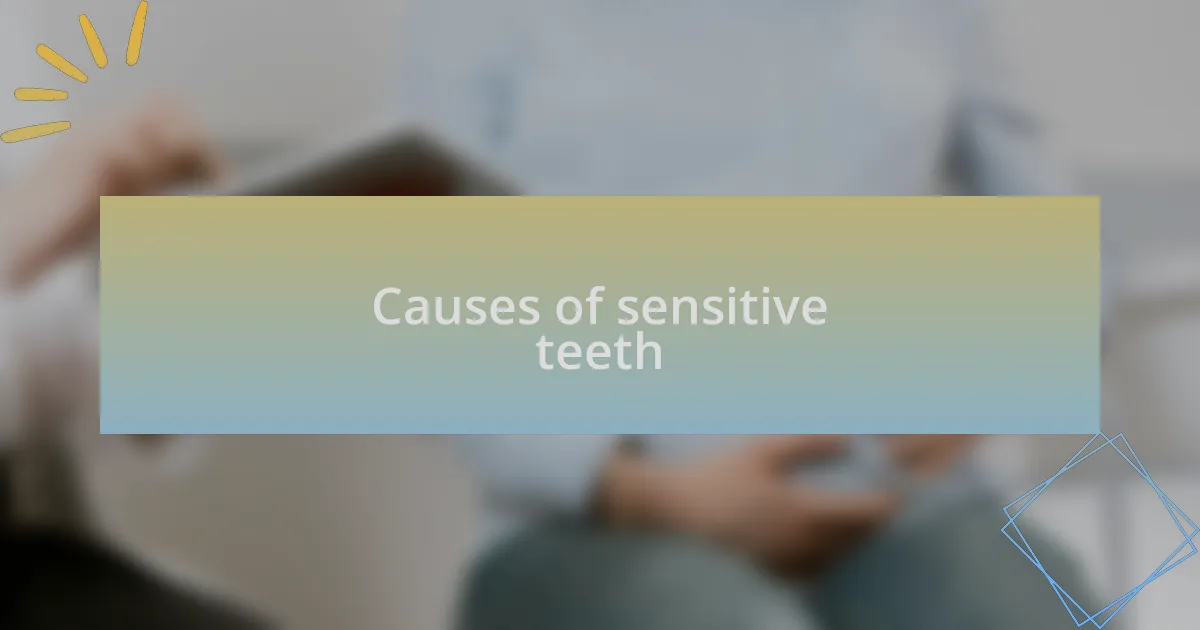
Causes of sensitive teeth
It’s interesting how many factors can lead to tooth sensitivity. For instance, I’ve noticed that many people who frequently consume acidic beverages, like soda or wine, often struggle with sensitivity. The acid can erode enamel, leading to direct exposure of the dentin, which is really a recipe for discomfort.
Another common cause I’ve encountered in practice is gum recession. When I explain how it can happen due to periodontal disease or even just brushing too hard, I see a lightbulb moment in my patients. The truth is, once the gums pull back, the roots get exposed, and those roots are more susceptible to sensitivity because they lack protective enamel.
Finally, I’ve personally experienced the effects of teeth grinding, or bruxism, under stress. It’s astonishing how a simple habit, often unnoticed, can wear down your teeth and make them sensitive over time. Have you ever noticed how tension manifests physically, leading to discomfort that lingers long after the stress has passed? Understanding these causes isn’t just about identifying a problem; it can pave the way to effective solutions.
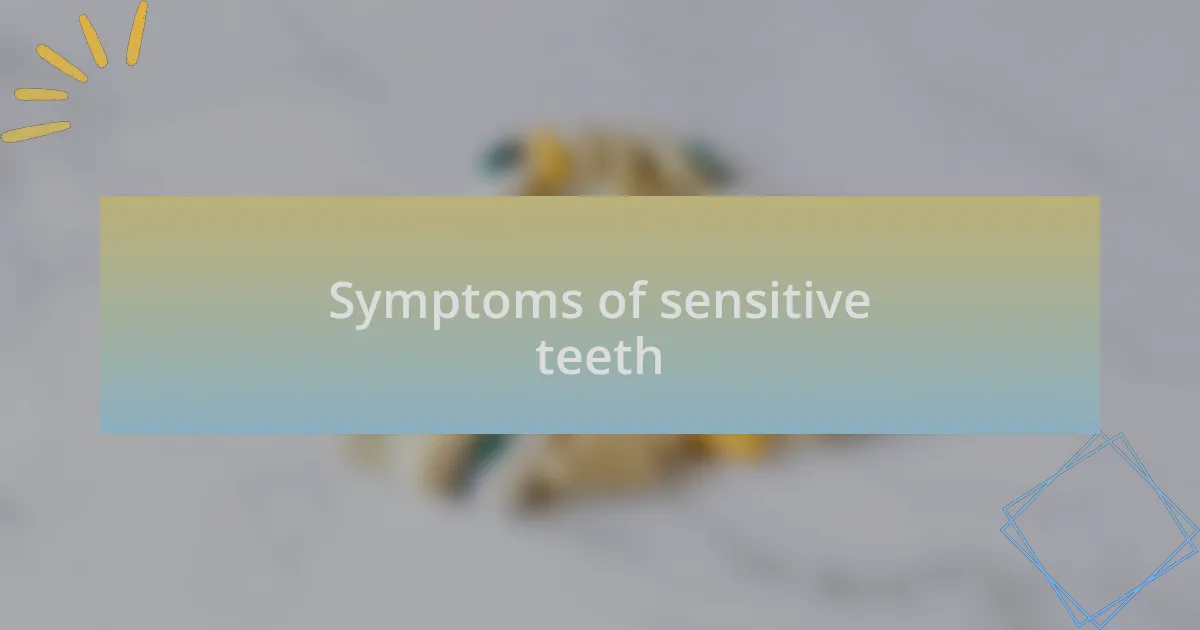
Symptoms of sensitive teeth
The symptoms of sensitive teeth can manifest in surprising ways, and recognizing them can truly change your dental health experience. I often hear from patients that they feel a sudden sharp pain when consuming hot or cold foods and drinks. It’s a jarring sensation, isn’t it? I know that moment well—taking a sip of coffee and flinching as if the cup itself is too hot to handle.
Another sign I’ve noticed is the discomfort that arises when brushing or flossing. I remember a time when I would avoid certain areas while brushing, almost instinctively, out of fear of that painful jolt. It’s not just about physical discomfort; that anxiety can really impact your oral care routine. Have you ever held back from thoroughly cleaning your teeth because of that apprehension?
Lastly, some of my patients describe a lingering ache that doesn’t quite go away, often intensifying as the day progresses. I relate to this feeling, as it can overshadow everything I do, reminding me that my dental health needs attention. Recognizing these symptoms is crucial; it’s the first step towards addressing the sensitivity and regaining comfort in daily life.
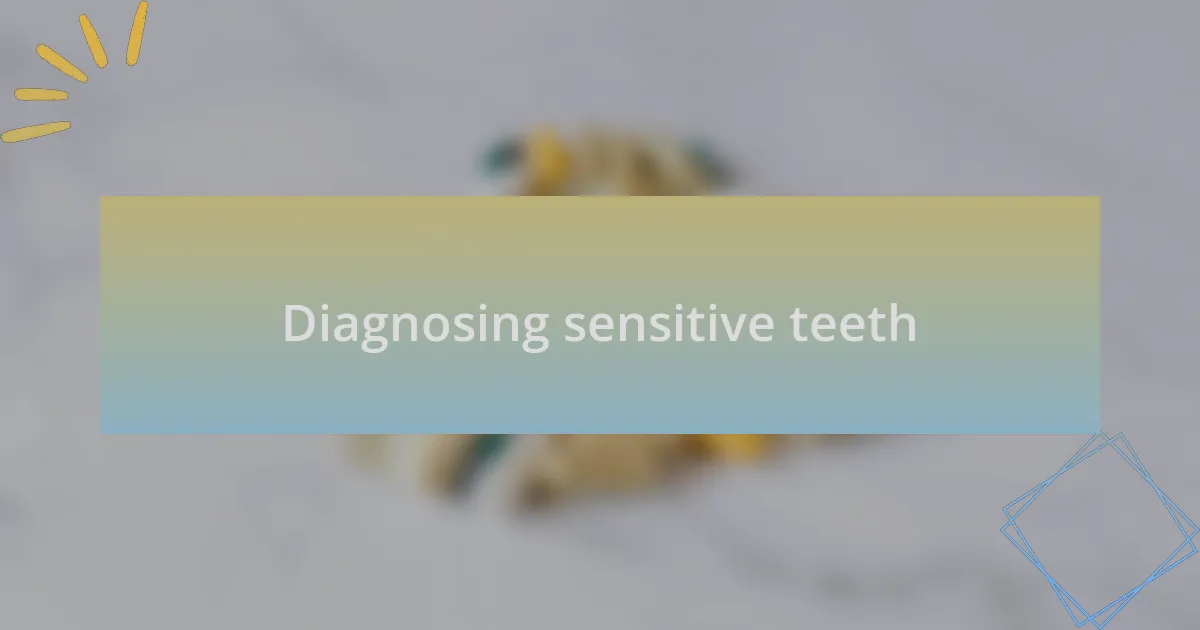
Diagnosing sensitive teeth
Diagnosing sensitive teeth often begins with a thorough examination by a dental professional. I recall a time when a patient walked in, bracing themselves against the pain, unsure of what was causing their discomfort. It’s crucial to establish a clear understanding of their symptoms, as this can guide us in identifying the exact issue. Are you aware of how simplifying your situation through conversation can sometimes unveil the hidden complexity behind your pain?
During the diagnosis, we might conduct tests to assess the level of sensitivity. This could include gentle tapping on teeth or exposing them to hot, cold, or sweet stimuli. I remember when I tested a patient and saw the immediate reaction as a rush of cold air hit their teeth—it illuminated their discomfort in a way that words simply couldn’t convey. How often do you think a simple test like this could reveal so much about your dental health?
Additional factors often contribute to tooth sensitivity, including gum recession or enamel erosion. I vividly remember a moment with a patient who had both issues but hadn’t connected the dots. We discussed how important it is to be aware of dietary habits or oral hygiene routines that may lead to these conditions. Have you ever contemplated how your daily choices impact your teeth? Each small detail can play a significant role in diagnosing and ultimately addressing sensitive teeth.

Treatment options for sensitive teeth
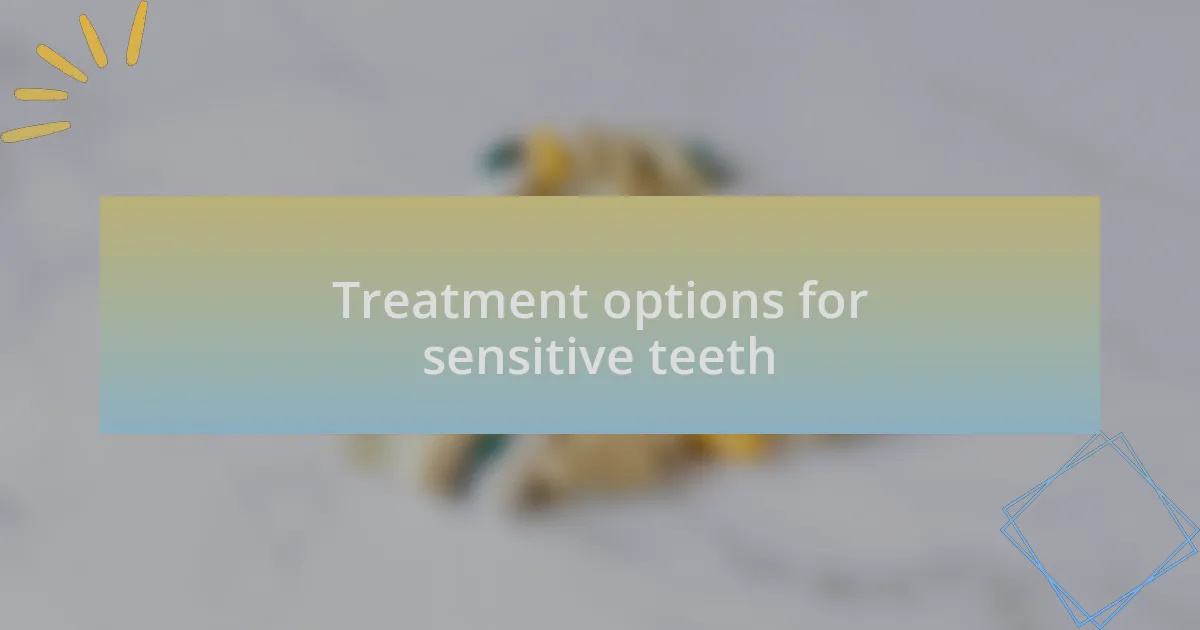
Treatment options for sensitive teeth
When it comes to treating sensitive teeth, one of the first options I often recommend is a desensitizing toothpaste. I remember the relief on a patient’s face when I explained how these pastes can block nerve endings in the teeth, providing much-needed comfort. Have you ever considered how something as simple as changing your toothpaste could make a significant difference in your daily life?
Another effective solution is fluoride treatment, which I’ve seen work wonders. Applying fluoride directly to the teeth can strengthen enamel and make it more resistant to acidity. Once, I had a patient who was skeptical but agreed to a fluoride treatment. Their surprise after just a few applications was palpable—they found a newfound confidence in enjoying their favorite foods again. Isn’t it amazing how a little extra care can transform your experience with sensitive teeth?
For more severe cases, dental procedures can offer lasting relief. I’ve had patients who benefited from dental bonding or sealants, which protect exposed areas of their teeth. Each time I mention these options, I notice curiosity in my patients’ eyes—how often do we overlook professional interventions that could change our comfort level completely? Sometimes, taking that step could be the game changer in managing tooth sensitivity.
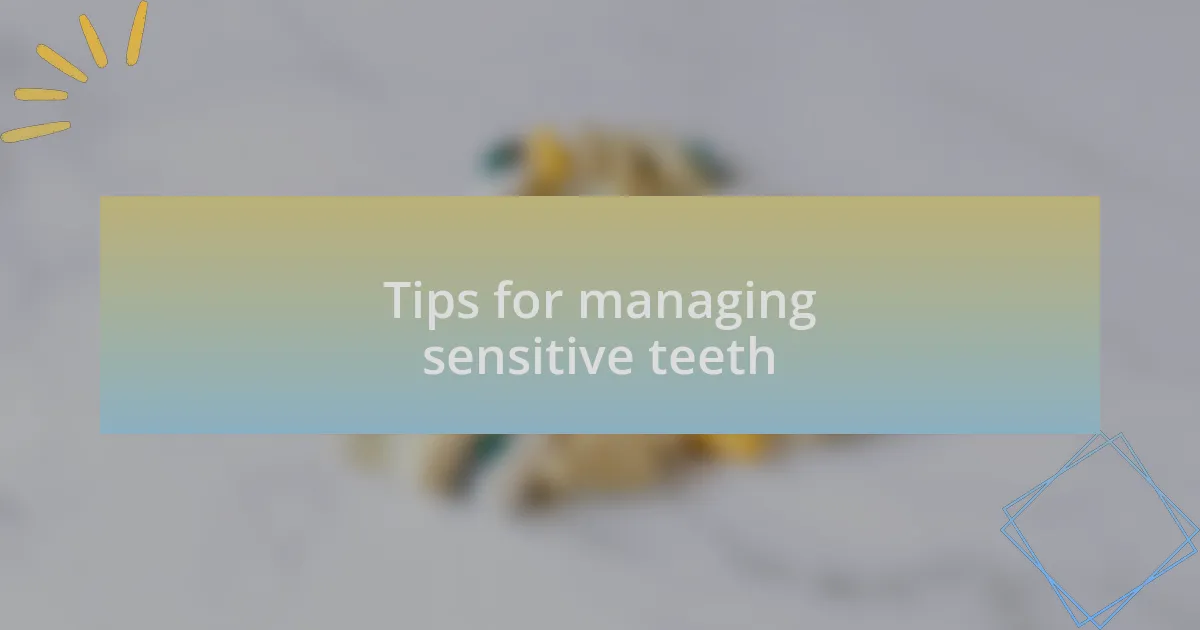
Tips for managing sensitive teeth
When it comes to managing sensitive teeth, I often encourage my patients to use a soft-bristled toothbrush. I remember one patient who switched from a hard brush and found that not only did her teeth feel better, but her gums seemed healthier too. Have you ever thought about how gentle brushing can make such a difference?
Another tip that I can’t stress enough is to be cautious with very hot or cold foods and drinks. One time, I encountered a patient who loved ice-cold beverages but ended up with a painful experience from it. I suggested he try letting his drinks sit for a few moments before indulging. It’s incredible how a simple change like that can improve comfort and allow you to enjoy your favorites without fear!
Finally, incorporating a fluoride mouthwash into your daily routine can be a game changer. I’ve found that my patients who do this often report less sensitivity over time. Isn’t it interesting how something extra in your regimen can lead to such notable relief? Consistency is key—what steps are you willing to take to prioritize your dental health?
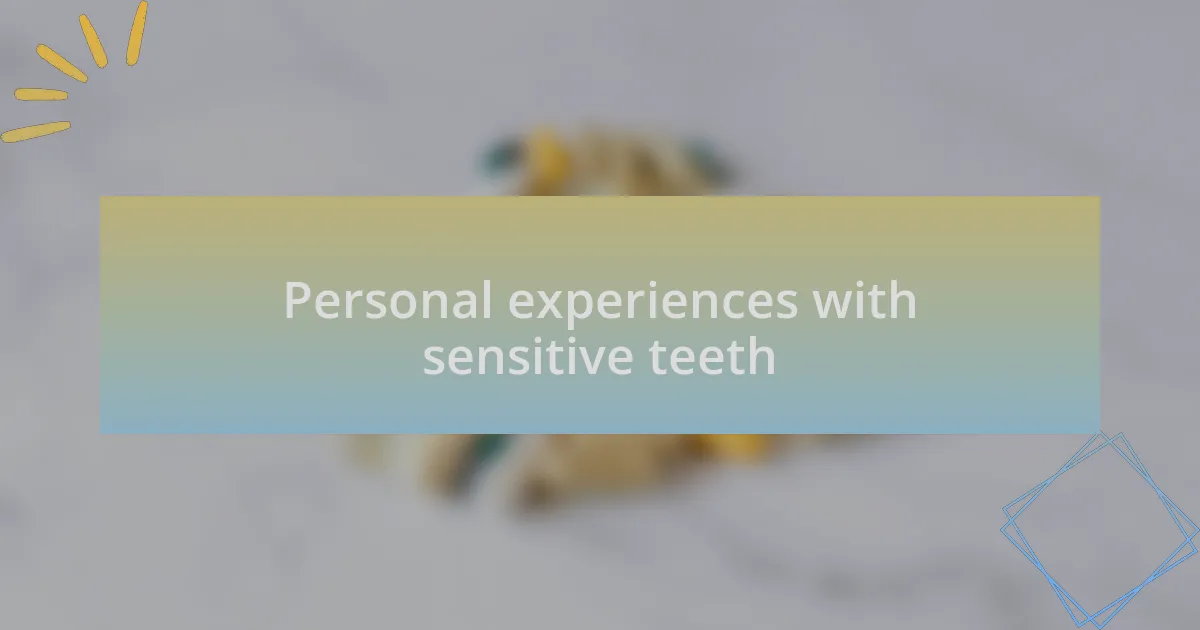
Personal experiences with sensitive teeth
Sensitive teeth can be quite the challenge. I recall a time during my college years when I couldn’t enjoy ice cream without wincing in pain. Just the thought of that sharp, sudden sensation is enough to make me hesitate with my dessert choices even now. Have you ever experienced that kind of heart-sinking moment when you realize your favorite treat is now a source of discomfort?
One winter, I went for a steaming cup of coffee only to feel a jolt of sensitivity with each sip. It was disheartening because I loved that cozy feeling of warmth during the cold months. I began to wonder—was it worth sacrificing comfort for a moment of enjoyment? This little epiphany led me to experiment with different temperatures. Gradually, I learned to savor my coffee in a way that didn’t leave me wincing at every gulp.
I also remember feeling somewhat embarrassed when a friend asked me to try a sour candy on a whim. The blast of acidity sent uncomfortable tingles shooting through my teeth, and I could barely smile through the experience. It made me more mindful about what I consume and share with others. Have you had moments like this where sensitivity kept you from enjoying what should have been a fun time? It’s a reminder that being aware of these triggers can be a vital part of our daily lives.